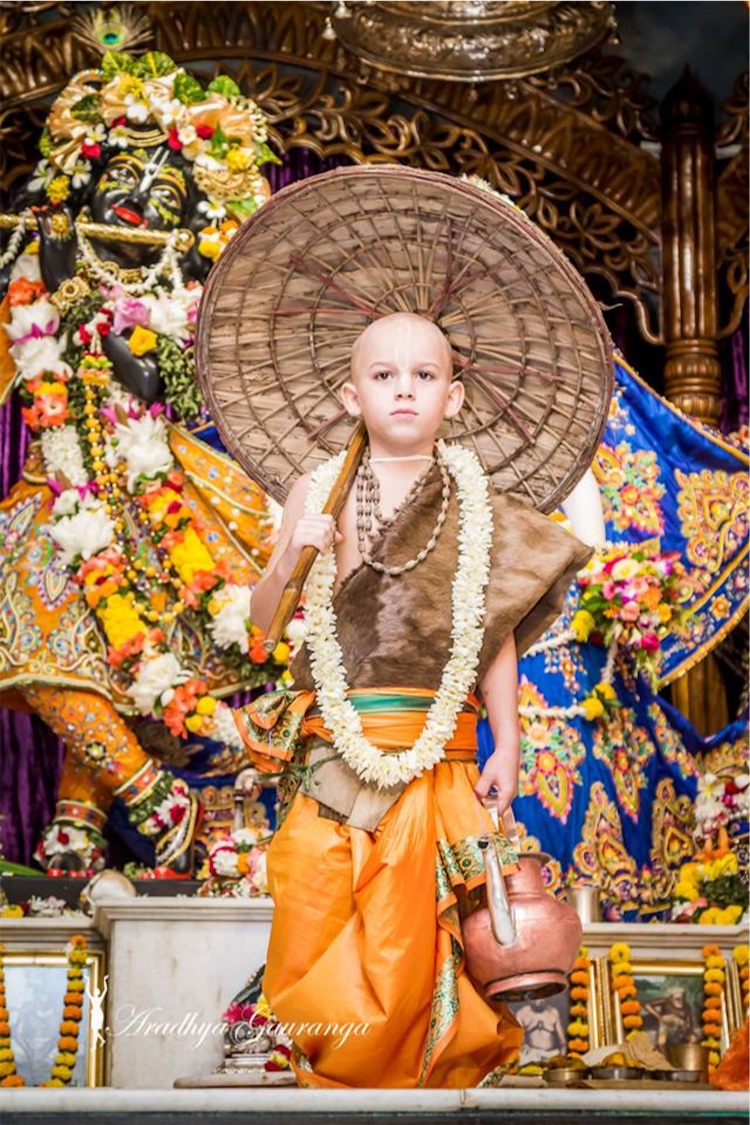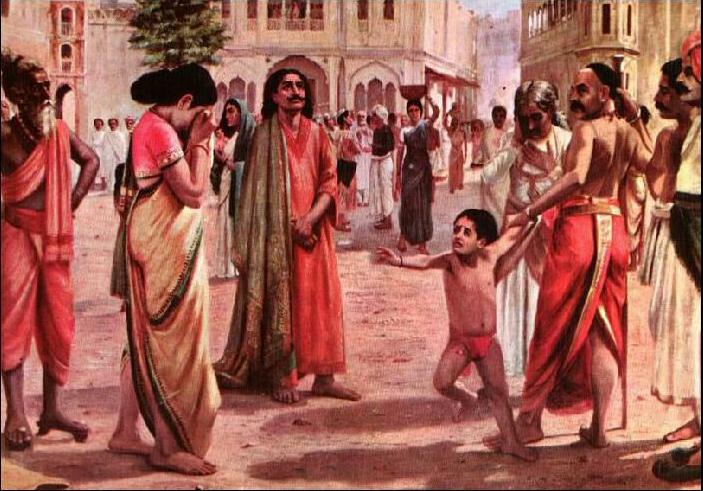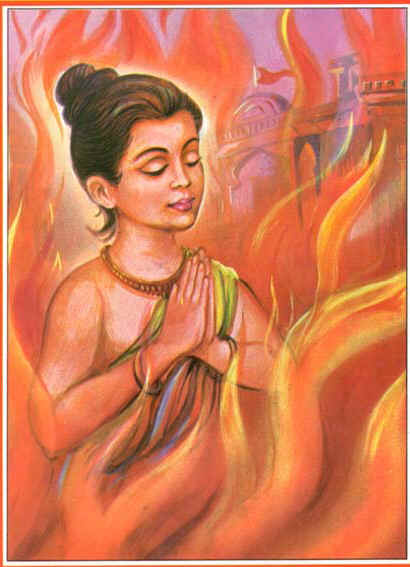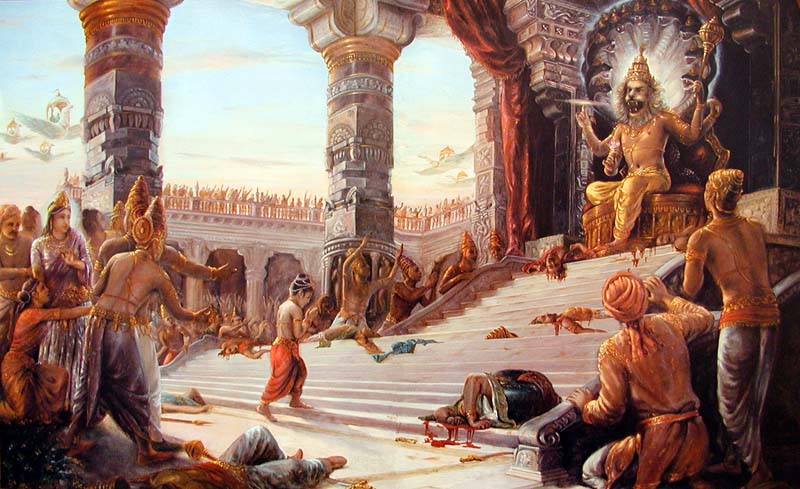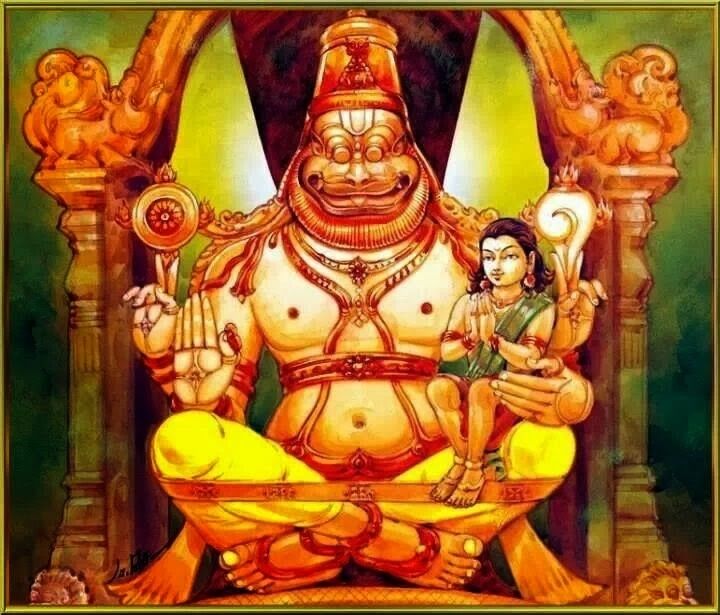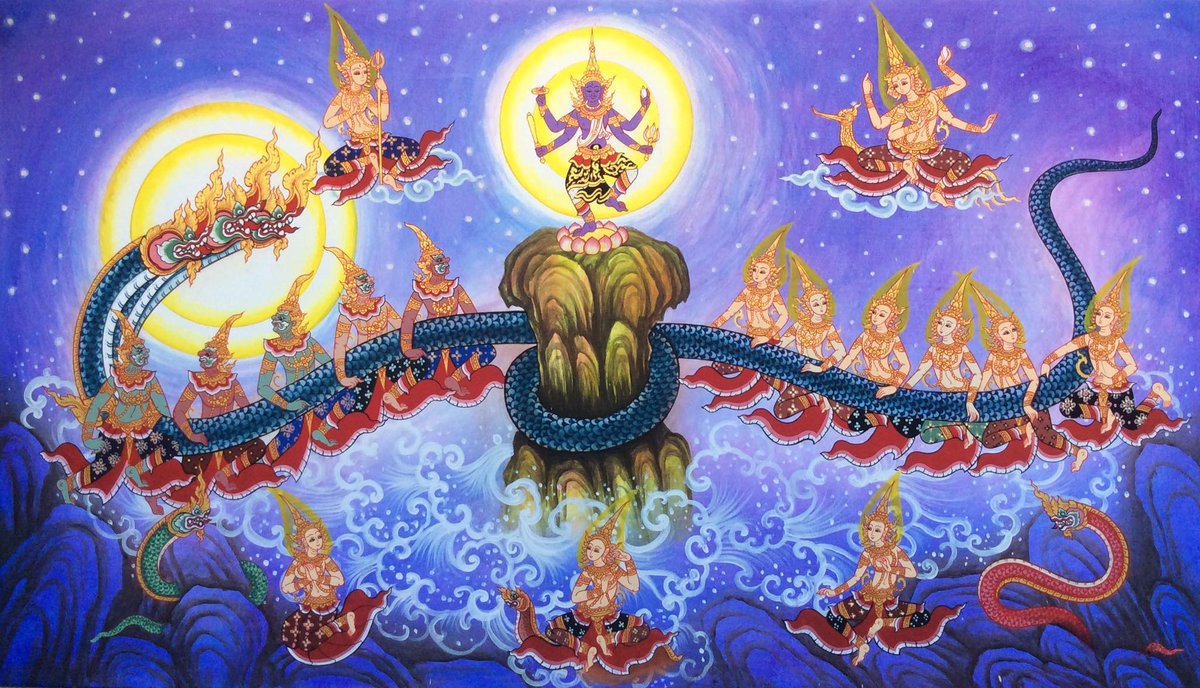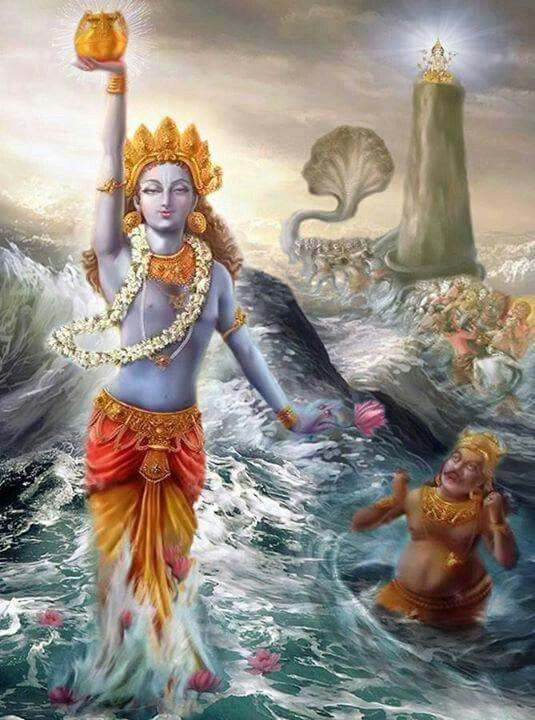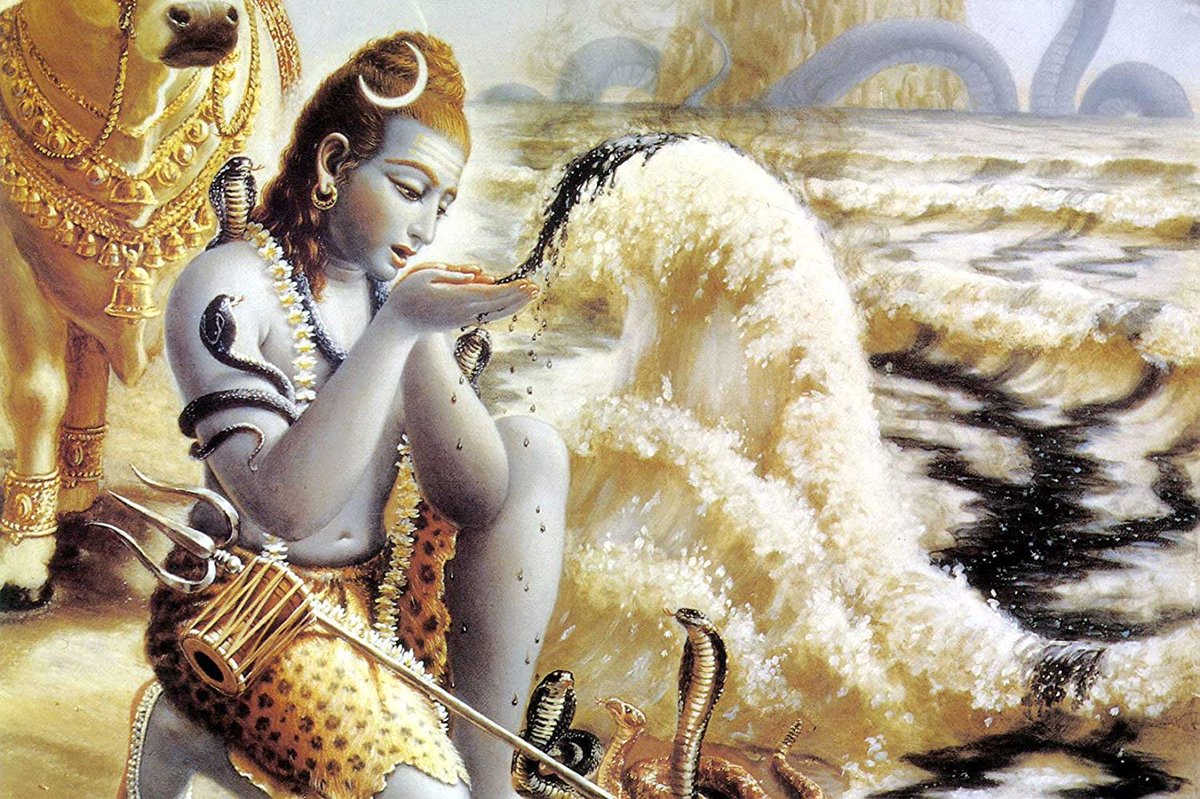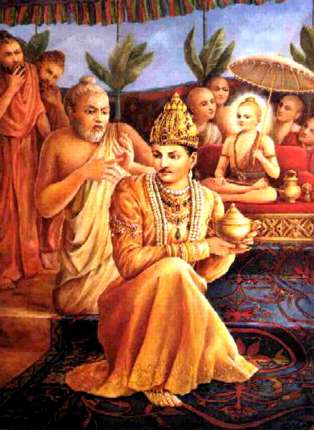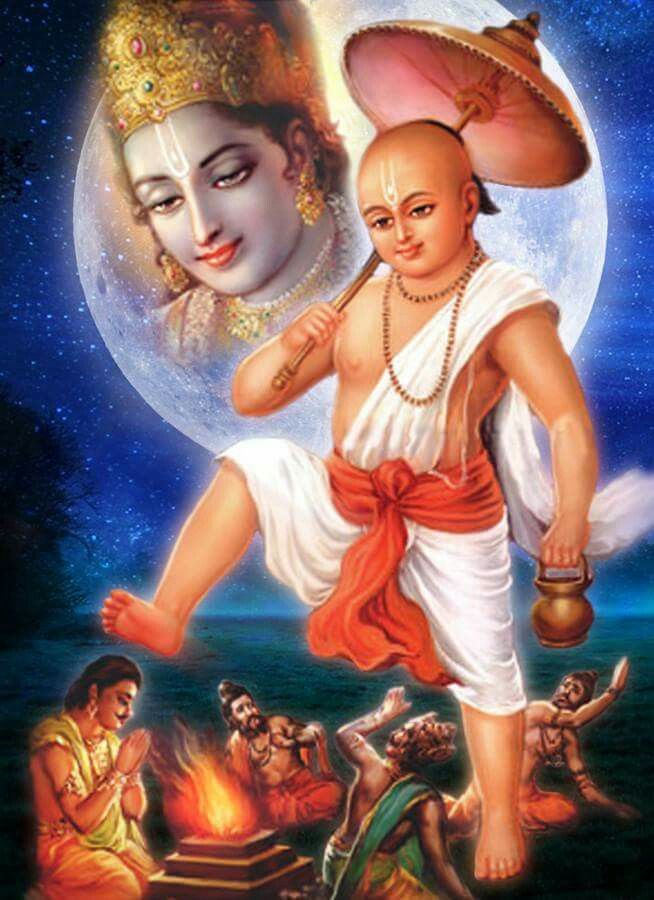Wish you all happy Vaman Dwadashi- the appearance day of Lord Vaman Dev. This festival is also celebrated as Onam in Kerala.
Let us read about the lessons we can learn from this beautiful pastime of Lord Vaman & His devotee King Bali Maharaj or King Mahabali. Thread...
Let us read about the lessons we can learn from this beautiful pastime of Lord Vaman & His devotee King Bali Maharaj or King Mahabali. Thread...
God is the master of all arts, including the art of conflict resolution. He is the loving father of all, and His every action benefits all His children. The story of Lord Vamana shows how the Lord satisfied two rival parties and ended a cosmic war between the demons and demigods.
We also learn from this pastime that the highest compassion of the Lord is His depriving His devotee of all material possessions so that the devotee can surrender unto Him unconditionally.
The Lord does this to increase the devotees& #39; loving reliance upon Him, freeing them from dependence on their fleeting worldly powers.
The story of Lord Vamana is a sequel to the story of Lord Nrisimha. Briefly stated, Lord Nrisimha descended to protect His devotee Prahlada Maharaja, who was terrorized by his atheist father, Hiranyakashipu.
After Sri Nrisimhadeva killed & liberated the atheist tyrant, Prahlada was crowned emperor of the demons, the enemies of the demigods. The demigods (administrative heads of the universe) then regained their sovereignty of heaven, which had been under Hiranyakishipu& #39;s control.
After Nrisimhadeva set things in order, how did conflict again arise between the demons and demigods? Now that the peace-loving saintly king Prahlada was ruling the demons, how could there be wars?
Prahlada was so peace loving and saintly that he demonstrated his selflessness by caring more for his public than for his own family.
When Prahlada& #39;s son Virochana wished to marry a girl desired by a young brahmana, Prahlada instructed Virochana to renounce his own desire.
When Prahlada& #39;s son Virochana wished to marry a girl desired by a young brahmana, Prahlada instructed Virochana to renounce his own desire.
Prahlada thus showed that the king and his family should always serve the public and never exert force or power over them to fulfill their own desires. (Mahabharata, Udyoga Parva 35).
With such an amiable king in charge, the demons were peaceable. But after Prahlada renounced the throne and passed it on to his son Virochana, the hatred among the demigods and demons arose again.
Here& #39;s the history behind Prahlada& #39;s renouncing the throne.
Here& #39;s the history behind Prahlada& #39;s renouncing the throne.
Once, while Prahlada was still ruling, a sage bathing in a holy river was bit by a serpent, which coiled around his legs and dragged him underwater. Because of his sincere faith in the protection of Lord Vishnu, the sage was unaffected.
The snake pulled him all the way down to the subterranean kingdom of the demons, where Prahlada honored him. During their meeting, the sage inspired Prahlada to visit pilgrimage sites.
On a visit to a holy forest, Prahlada saw a pine tree pierced with arrows, its sap looking like tears of anguish. Near the tree sat two ascetics. Angered by the sight of their arrows in the innocent tree, Prahlada attacked them. But the ascetics easily defeated him in battle.
He then prayed to Lord Vishnu, who told him he could win over the two ascetics only by devotion. The ascetics were in fact Nara-Narayana Rishis, incarnations of Vishnu. To beg their pardon for fighting them, Prahlada then renounced his kingdom and retired to perform penance.
After this incident, Prahlada served only as an advisor to his successors. (Vamana Purana 7–8)
Virochana became the next emperor of the demons. Blessed with a dazzling golden crown, a boon from the sun-god, he became arrogant and offensive toward the demigods.
Virochana became the next emperor of the demons. Blessed with a dazzling golden crown, a boon from the sun-god, he became arrogant and offensive toward the demigods.
Virochana had received the benediction that he could not be killed as long as he wore the crown. (Ganesha Purana 2, 29) Knowing this, the demigods conspired against him. Disguised as sages, they entreated him, and the generous Virochana vowed to grant their wish.
They begged for his crown. Even though Virochana recognized the demigods& #39; plot, true to his word he parted with his crown &his life as well.
Enraged at the demigods& #39; intrigue, Bali, son of Virochana, became an avowed adversary of the demigods, the ruthless slayers of his father
Enraged at the demigods& #39; intrigue, Bali, son of Virochana, became an avowed adversary of the demigods, the ruthless slayers of his father
Once, when Indra, king of the demigods, had haughtily rejected a garland offered by a sage, the sage had cursed the demigods. As a result of this curse, Bali easily defeated the demigods in battle and won the kingdom of heaven.
The demigods were at a disadvantage: The demons were fearless of death because their preceptor Shukracharya could revive them from the dead with a mantra.
Chased from their abodes, the demigods surrendered to Lord Vishnu, who told them to churn the milk ocean with the demons.
Chased from their abodes, the demigods surrendered to Lord Vishnu, who told them to churn the milk ocean with the demons.
The churning would recover jewels that had fallen into the ocean from Bali& #39;s hands while he was transporting the treasure of the gods to his capital. The churning would also extract ambrosia, which could immortalize the demigods. (Vishnu Purana 1.9, Matsya Purana 250–251)
The churning first produced poison,then valuable things such as gems, jewels, animals, gods,goddesses. Finally the pot of ambrosia emerged. Lord Vishnu, disguised as a woman who was the embodiment of sensual beauty, deceived the demons & delivered all the ambrosia to the demigods
Empowered with the nectar of immortality, the demigods repulsed the attacking demons, who wished to secure the nectar for themselves. The demons then resorted to illusory maneuvers, bewildering the demigods.
The demigods took shelter of Lord Vishnu, who effortlessly thwarted the demons& #39; tricks. With the Lord on their side, the demigods killed Bali. Taking advantage of the ailing demon army, the demigods began mercilessly massacring them.
Then Narada Muni, the sage among the demigods, forbade them to continue the carnage. He advised them to return to their heavenly kingdom. He told the demons to take their dead emperor, Bali, to Shukracharya, who revived all the dead demons whose limbs were intact.
When Bali was revived, under the guidance of Shukracharya he performed a sacrifice for universal conquest. He thus obtained an invincible bow, impenetrable armor, two inexhaustible quivers, and a golden chariot led by fine horses and bearing a splendid flag.
After receiving these gifts and blessings, Bali charged toward Indra& #39;s capital and attacked with full force. Indra and the other demigods hid. Blessed by his teacher, Bali reigned over heaven. Following the good counsel of his grandfather Prahlada, Bali ruled virtuously.
Aditi, the mother of the demigods, lamented upon seeing her sons wandering homeless. Her husband, Kashyapa, advised her to stay calm in both loss and again, but he could not pacify her. He then recommended that she perform a twelve-day vow to satisfy Lord Krishna.
Pleased with her vow, the Lord promised to appear as her son. In trance, Kashyapa saw the Lord. He then impregnated his wife, and the Lord entered her womb.
The blue-hued Lord Vamana appeared in this world adorned with golden silk and holding in His four hands a conch shell, a disc, a club, and a lotus. His appearance brought joy to all creation.
He then transformed into a dwarf brahmana boy, & at His birthday ceremony all the demigods and sages presented Him gifts. The sun-god chanted Vedic mantras, the priest of the demigods decorated His chest with the sacred thread, and Kashyapa Muni put a straw belt around His waist
Mother Earth and His own mother provided Him a deerskin and a loincloth. The Moon (king of the forests) offered Him the rod of a celibate, and the heavens furnished an umbrella. Brahma supplied a water pot, the seven sages handed Him sacred grass,
and the goddess of learning equipped Him with prayer beads. The treasurer of the demigods gave a begging pot, and Bhagavati, Lord Shiva& #39;s wife, gave Him His first alms.
Sri Vamanadeva performed fire sacrifices to set the proper example for all sages.
Sri Vamanadeva performed fire sacrifices to set the proper example for all sages.
When he heard that King Bali was engaged in sacrifice under the guidance of Shukracharya, He went to see Bali, pressing down the surface of the globe with every step.
When Vamanadeva approached Bali, the sacrificial fire was nearly extinguished, the demons couldn& #39;t receive their shares of sacrifice, and the hymns emanating from the mouths of the sages empowered the demigods instead of the demons. (Nrisimha Purana 45.10–13)
All the sages at the sacrifice were stunned to see the radiance emanating from Vamanadeva. They thought the sun or fire incarnate was approaching, and they all offered their respects to Him.
Bali Maharaja, cordially seating Him, washed His lotus feet. The great king then placed upon his head the sacred water sanctified by touching the Lord& #39;s lotus feet, just as Lord Shiva carries in his hair the holy Ganges. Maharaja Bali then asked the Lord how he could serve Him.
After praising Bali& #39;s dynasty as glorious and unfailing in its vows of charity and chivalry, Vamana asked him for only three paces of land. Bali Maharaja derided His decision as immature and insisted He ask for something more substantial.
Vamanadeva replied that greed can never be satiated; it will drive the possessor to run after more.
In effect, Vamanadeva was instructing Bali Maharaja that his kingship over heaven was only satisfying his selfish greed and tormenting the demigods
In effect, Vamanadeva was instructing Bali Maharaja that his kingship over heaven was only satisfying his selfish greed and tormenting the demigods
As the supreme warrior, the Lord could have easily regained the heavens for the demigods by vanquishing Bali& #39;s pride in battle, but He came as a boy sage to instruct His devotee Bali Maharaja about giving up excessive attachment to proprietorship.
The Lord instructed Bali that one should be satisfied with whatever one owns by the will of providence, and not hanker for others& #39; property.
Bali then agreed to grant the Lord three paces of land. Just as he was about to confirm his promise with water, Shukracharya, recognizing Vamanadeva as Lord Vishnu Himself, tried to dissuade Bali from fulfilling his promise.
Bali maintained Shukracharya, who did not want his rich benefactor to lose all his wealth. He informed Bali that the boy in front of him was actually the Supreme Lord Vishnu, who had come to retrieve all the opulence of the demigods.
Shukracharya also warned Bali that he would suffer in hell for failing to fulfill his promise to Lord Vamana, since Lord Vamana would cover Bali& #39;s entire kingdom with two steps, not leaving any space for a third step.
Bali had not yet uttered om, so in fact, said Shukracharya, his promise could be revoked.
Bali was not prepared to go back on his word, however. He knew that Mother Earth cannot bear the weight of a dishonest person.
Bali was not prepared to go back on his word, however. He knew that Mother Earth cannot bear the weight of a dishonest person.
Now that the Lord Himself had come to his door, how could he go against His supreme will? Though not abiding by the guru& #39;s orders would ordinarily be an offense, Bali rejected his guru& #39;s advice because it contradicted with the principle of satisfying the Lord.
As for hell, Bali Maharaja said, "I do not fear hell, poverty, an ocean of distress, falldown from my position, or even death itself as much as I fear cheating a brahmana."
He cited the examples of great souls who sacrificed their lives for others.
He cited the examples of great souls who sacrificed their lives for others.
After all, death takes away everything, so why be attached to one& #39;s possessions?
Bali continued: "Many kings have attained immortal fame by their heroic deeds, but rarely do they obtain the fortune to serve a saint.....
Bali continued: "Many kings have attained immortal fame by their heroic deeds, but rarely do they obtain the fortune to serve a saint.....
And my fortune is beyond limit, for the husband of the goddess of fortune has come as a saint to beg from me. My dear teacher, you yourself worship Vishnu, and now that He has appeared before me, I must carry out His instruction, even though He may have come as an enemy.
Since He is now a brahmana boy, I will not fight with Him, though He may arrest or kill me." (Srimad-Bhagavatam 8.20.12)
On hearing this, Shukracharya condemned his disobedient disciple to lose all his wealth.
On hearing this, Shukracharya condemned his disobedient disciple to lose all his wealth.
Even after being cursed, Bali offered water to Vamanadeva, thus solidifying his promise. Shukracharya tried to intervene, but was unable to do so. [See sidebar: "Shukracharya& #39;s Reformation."]
Though appearing as a dwarf, the Lord expanded into His cosmic form, revealing the entire universe. With His first step He covered all the lower planets up to the earth, and with His second He reached all the way to the top of the universe.
His toenail pierced the universal coverings, and the water of the Causal Ocean (in which countless universes float) surged in, washed the Lord& #39;s lotus feet, and descended into our universe as the celestial Ganges. ( Srimad-Bhagavatam 5.17.1).
The twelfth-century poet and devotee Jayadeva Goswami writes:
chalayasi vikramane balim adbhuta-vamana
pada-nakha-nira-janita-jana-pavana
keshava dhrita-vamana-rupa jaya jagadisha hare
chalayasi vikramane balim adbhuta-vamana
pada-nakha-nira-janita-jana-pavana
keshava dhrita-vamana-rupa jaya jagadisha hare
"O Lord of the universe! O Lord Hari, who have assumed the form of a dwarf-brahmana! O wonderful dwarf, by Your massive steps You deceive King Bali, and by the Ganges water that has emanated from the nails of Your lotus feet, You deliver all living beings within this world."
Vamanadeva then revealed Himself again as a young sage, and all the demigods worshiped Him. The demons, on the other hand, charged the Lord, but they were slain by the His powerful associates.
Bali Maharaja ordered his soldiers to desist from warfare, proclaiming that the supreme time factor was now not in their favor. No one can go against the will of the Supreme Lord, he announced.
The demon soldiers returned to their residences in the lower planets.
The demon soldiers returned to their residences in the lower planets.
Garuda, the eagle carrier of Lord Vishnu, then arrested Bali Maharaja with snake ropes, and the Lord rebuked Bali for failing to offer three paces of land. For that failure he would have to live in hell.
The Lord took away everything from Bali, except his free will. God can take anything from us, but He never takes our free will; we always have the choice of whether or not to surrender to Him.
To fulfill his promise, Bali then surrendered himself at the lotus feet of the Lord and asked Him to place the third step on his head. For this deed, Bali is famed as the exemplar of full surrender unto the Lord.
In fact, Bali considered the Lord& #39;s actions more merciful to himself than to Indra. Indra would certainly regain his opulence and kingdom, but by being freed of false prestige, Bali had attained pure devotional service unto the Lord.
When Vamanadeva had appeared in the womb of Aditi, Prahlada had warned Bali that the Lord would soon defeat the demons and return the heavens to the demigods.
Bali had arrogantly challenged, "Who is this Vishnu compared to my demon warriors?"
Bali had arrogantly challenged, "Who is this Vishnu compared to my demon warriors?"
Upon hearing his grandson& #39;s bombast, Prahlada had rebuked him: "How can you speak like this? I curse you to lose your prestigious position, for you have insulted my worshipable Lord Vishnu."
Realizing his mistake, Bali had begged forgiveness for his pride.
Realizing his mistake, Bali had begged forgiveness for his pride.
Though the curse could not be withdrawn, Prahlada assured Bali that the Lord Himself would protect him. (Vamana Purana 77) Now Prahlada Maharaja honored Lord Vamana& #39;s corrective action as beneficial for Bali, who had grown arrogant with material opulence.
In the Srimad-Bhagavatam (10.88.8–9), the Lord Himself proclaims: "If I especially favor someone, I gradually deprive him of his wealth. Then the relatives and friends of such a poverty-stricken man abandon him. In this way he suffers one distress after another.
When he becomes frustrated in his attempts to make money and instead befriends My devotees, I bestow My special mercy upon him."
Even Bali Maharaja& #39;s wife accepted his arrest as proper, since he had claimed ownership of the property of the Lord, the original owner of everything.
Even Bali Maharaja& #39;s wife accepted his arrest as proper, since he had claimed ownership of the property of the Lord, the original owner of everything.
Lord Brahma then entreated Vamanadeva to release Bali, who had surrendered all his possessions to the Lord, including his own body. Vamanadeva accepted Brahma& #39;s request, being greatly pleased with Bali& #39;s integrity, which had remained intact......
….even though his guru had cursed him, he& #39;d lost his kingdom, he& #39;d been defeated and arrested, and his friends and relatives had rejected him. Lord Vamana blessed Maharaja Bali to obtain the post of Indra in a later millennium.
Till then he would rule as king in a subterranean planet designed by the architect of the gods to be a hundred times more resplendent than heaven. (Srimad-Bhagavatam 8.22.32–33) Lord Vamana Himself guarded Bali& #39;s kingdom.
Bali and Prahlada praised the Lord with deep affection. They noted that even the demigods had never achieved the causeless mercy He had shown the demons. Then the Lord returned all the lands He had taken from Bali Maharaja to their original owners—Indra and the demigods.
The Lord often acts in unpredictably wondrous ways, but His pastimes always set the true dharma for the benefit of everyone. Vamanadeva& #39;s recovering the heavens from Bali and delivering them to the demigods benefited both Indra and Bali.
They both obtained their kingdoms, but also something of much higher value: deep trust and love for Vamanadeva, who fulfilled double roles as Indra& #39;s younger brother and Bali& #39;s protector.
This pastime also glorifies Bali Maharaja& #39;s unwavering resolve to fulfill his vow in any circumstance. Bali Maharaja is one of the twelve great personalities (mahajanas) revered for their exclusive devotion to the Lord even in the most trying situations.

 Read on Twitter
Read on Twitter